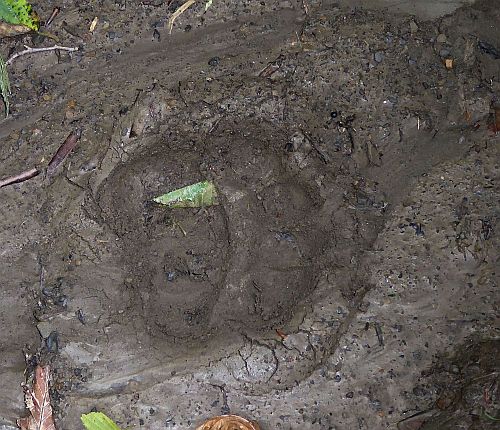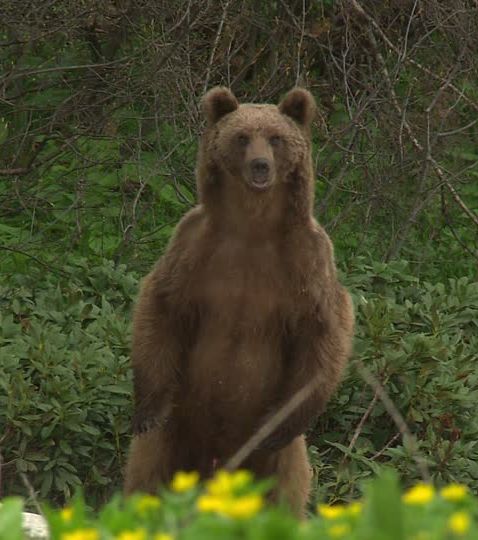

"What should I do when I meet a bear?"
"You don't have to do anything. Bear will take care of everything."Slovak joke
Of all possible hazards lurking in the Caucasus, people most often ask me about bears. How many live there? Are they dangerous? Is it safe to go hiking at all?
In reality, the darger posed by bears in the Caucasus is often overrated. Bears are shy and avoid contact with humans. I haven't heard of a single accident when hiker in Caucasus got hurt by a bear. But even if the danger is not that acute, its still better to know what can happen in order to minimize potential risks. After all, I met more than one Georgian trekking with rifle so I guess they have their reasons (I hope not all of them were poachers).
Georgian part of Caucasus nowadays harbors up to 500 brown bears. Most of them retreated to remote mountain valleys, where they inhabit upper part of forest belt. Some of these valleys are popular among tourists, at least to some degree, so there is always a chance of an encounter - I know people who saw bears in Khobistskali (Tobavarchkhili trek), Ritseula (Lower Svaneti - Lower Racha trek) or Kovgra valley (Shatili - Juta trek). But their presense is not limited only to these pretty remote valleys, my friend Fergal saw a bear cub on a trail to the Chalaadi glacier in Svaneti (!).
Every bear is different, but their behaviour in general can be predicted. Therefore, it's better to be prepared for possible scenarios so you know what to do.
If bear detects you, he will usually get out of your way. However, they may not detect you in dense undergrowth, mist, when they feed themselves or if you are walkings against the wind. Therefore the best method to prevent encounter with a bear is to let him know you are coming. Let him know you are there - sing, whistle, clap with hands or trekking sticks. You don’t want to surprise a bear, - in such case there is much bigger chance that he will react aggresively. Be watchful, especially in the morning and evening, when are bears most active.

Bear track
Some people use “bear bells” - small bells they attach to their rucksacks. However, there is no consensus among experts whether they work or not so don’t rely only on them. They are not very loud, safer is to use the method of leading bear expert Stephen Herrero - to yodel.

Processed bear food
Equally important is not to lure bear to you. Do not camp at places with abundance of bear food (raspberries, blueberries) or at places with numerous animal tracks. Keep the camp clean - if you cook, wash cookware right after you finish eating. Don’t cook in your tent and if you have some strongly aromatic food or trash (bacon, canned fish), seal them in airtight containers.
Many experts recommend even harsher measures such as to cook at least 100 meters away from tent or hang food on trees. However, these practices come from USA where encounters with bears are much more common. In Georgia they could seem foolish.
If you see a bear not far from you, stand still and try to determine, if he knows you are there or not. If he is not aware of you, slowly walk away from him. Do it silently, don’t shout - you don’t want to surprise him. Never come closer to him, even if he seems to be calm.
If bear notices you, calmly identify yourself as a human - speak in a deep, soothing voice and wave arms above your head. Keep an eye on the bear, but avoid direct eye contact - bear could understand it as a sign of aggression. Don’t run away, it could provoke him into chasing you.
There are two types of bear attack on people - predatory and defensive. Eurasian brown bears living in Georgia almost never attack human as predators, most of their attacks are defensive. Still, it's good to know symptoms of defensive and offensive attacks, as reactions to them should be exactly the opposite.
There are several ways to identify defensive attack - before the actual attack, the bear tries to scare you, it huffs, barks and shows his teeth. He charges you with ears laid back and often stops before actual contact. He shows that he is nervous about your presence and you should go away. If you don't do it in time (but no running), then may come an actual attack.

Bear trying to identify a possible threat
Once the bear makes physical contact with you, be passive, drop to the ground and play dead. Lie on your belly with yours legs together. Hold yours hands together behind your hear so they protect your neck. Bears during defensive attacks often focus on the human face, if it’s not protected. When bear senses that you are not dangerous anymore, he usually leaves.
During the offensive attack, bear doesn't bluff, he attacks directly with his ears erected. In such point there is no point in playing dead and you must fight for your life.
I guess that’s all for now. But as I really dont want this article to end with recommendations such as "fight for your life" or “bear focuses on human face”, I would like to stress once again that bears living in Caucasus don’t prey on humans and such attacks are extremely rare.
Our own unwariness and overconfidence pose us much greater danger than any bear.
As you can see above, trekking in Georgia is not particularly risky compared to the rest of the world. Still, it would be reckless to travel without an insurance (I think you already see where is this going - I would be a very lousy travel blogger if I didn't try to sell you some travel insurance ). During the last 10 years I spent hiking and trekking, I used two insurances.
When I was younger, I used to have more time and could make several long trekking trips a year. My main priority was to protect myself and my relatives from unexpected costs. Because of this, I used to be a member of Austrian Alpine Club (Alpenverein). After paying the yearly membership fee of about 60 EUR, I got an insurance tailored for mountains which covered rescue costs, medical treatment as well as the repatriation costs (tho my parents didn´t look too relieved when I stressed this fact before travelling abroad).
Then my priorities shifted. Since I have a family now, I spend less time hiking and need an insurance which not only covers everything mentioned above but will also provide for them in case that something happens to me. Because of this, I started to look for more general insurance for specific dates. For my summer trekking trips, I use SafetyWing travel insurance since I am very satisfied with the coverage it offers for its cost.
SafetyWing also offers Remote Health - a more robust, full-fledged health insurance which, unlike their travel insurance covers also home country and pre-existing conditions and illnesses.
Disclaimer: Those SafetyWing links are the affiliates. That means that if you click it and buy some insurance from them, I will get a small comission. But that's not why I am promoting them, they simply look the best to me (compared it with local insurance companies as well as global ones such as World Nomads).


